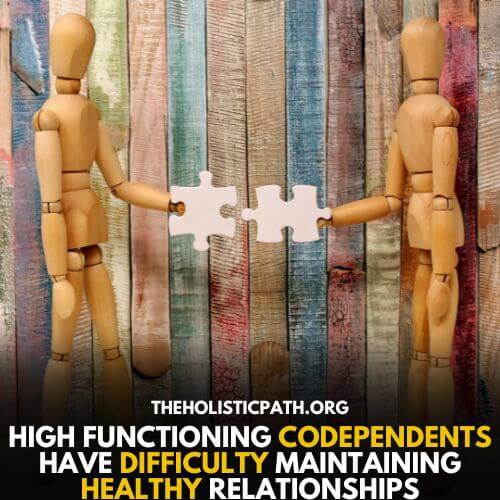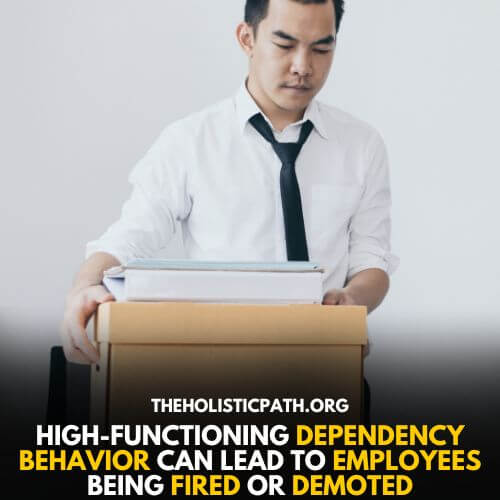Codependency is often viewed as a problem that only plagues those who are in relationships with addicts or alcoholics. However, there is a growing trend of high-functioning codependents who seem to have the disorder under control and may not even realize they are exhibiting codependent behaviors.
This article will explore the signs and symptoms of high-functioning codependency, how to identify if you or someone you know is affected by it, and some tips on how to manage the condition.
What Is High Functioning Codependency?
High-functioning codependency is a term used to describe someone who appears to be functioning well on the outside, but who is actually struggling with codependent tendencies.
This type of codependency can be difficult to spot because the person affected may not show any obvious signs of distress.

On the surface, high-functioning codependents may seem like they have it all together. They may be successful in their careers, have a strong network of friends and family, and be well-liked by others.
However, underneath this facade, high-functioning codependents often feel insecure, unworthy, and powerless. They may stay in relationships that are unhealthy or abusive because they feel they don’t deserve any better.
But high functioning codependents often have difficulty maintaining healthy relationships, communicating effectively, and dealing with difficult emotions. They may also have a high need for approval and validation from others.
They may also have trouble setting boundaries and end up taking on more than they can handle.
15 Causes Of High Functioning Codependency
High-functioning codependency can be caused by a variety of factors. Here are 15 common factors that may cause high functioning codependency:
- Trauma-based experiences can lead to high-functioning codependency. This includes physical or sexual abuse, emotional neglect, and exposure to violence.
- Early life experiences can also contribute to high-functioning codependency. For example, if a person’s parents were divorced or alcoholic, they may be more likely to develop codependent behaviors themselves.
- Having a personality disorder can also increase the risk of developing high-functioning codependency. For example, people with a borderline personality disorder often have very unstable relationships which can lead to codependent behaviors.
- Working in a helping profession can also increase the risk of developing high-functioning codependency. For example, people who are nurses, social workers, or therapists may be more likely to develop codependent behaviors in order to help others.
- Being raised in a family that is enmeshed or dysfunctional can also lead to high-functioning codependency. This means that the family is overly involved in each other’s lives and there is a lot of drama and chaos present.
- Having low self-esteem can also lead to high-functioning codependency. People who feel like they are not good enough tend to seek validation from others and may become overly dependent on them.
- Suffering from anxiety or depression can also lead to high-functioning codependency. People who are struggling with these conditions often feel like they cannot cope on their own and become reliant on others for support.
- Having an addiction can also lead to high-functioning codependency. People who are addicted often have problems with impulse control and become dependent on others for help with their addiction.
- Having poor communication skills can also lead to high-functioning codependency. People who struggle to communicate their feelings effectively may end up relying on others to do it for them.
- Feeling isolated or lonely can also lead to high-functioning codependency. People who feel like they don’t have anyone else often turn to others for support and become overly dependent on them
- Genetics may play a role in codependency. If one or both parents are codependent, it is likely that their children will be too.
- A dysfunctional family environment can contribute to the development of codependency. If a child grows up in a home where there is a lot of fighting, alcohol or drug abuse, or emotional neglect, they may learn to rely on themselves to take care of others and avoid emotional pain.
- Limited or distorted self-awareness: People with high functioning codependency may be unaware of their own needs and how they are impacting others. They may also have a distorted view of themselves and their relationships, seeing themselves as more helpful and giving than they actually are.
- Fear of abandonment: People with high functioning codependency may fear abandonment and rejection, becoming overly attached to others and doing anything to avoid being left alone.
- Perfectionism: People with high functioning codependency often have high standards for themselves and others, which can lead to perfectionism and a need for control.
Who Can Be Affected By High Functioning Codependency: Men or Women?
There’s no question that high-functioning codependency can have a negative impact on both men and women. However, it’s generally agreed that women are more likely to be negatively affected by this condition. This is due in part to the fact that women are more likely to be in codependent relationships than men.
Codependent relationships are characterized by an unhealthy dependence on the other person. In high-functioning codependency, the dependence is often emotional rather than physical. This can lead to feelings of insecurity, inadequacy, and low self-esteem. Women in high-functioning codependent relationships may also suffer from anxiety and depression.
Though codependency is often viewed as a disorder that primarily affects women, but this is not always the case. Men can also be codependent, and in some cases, they may be more likely to be codependent than women.
Codependency can occur in any type of relationship, but it is particularly common in relationships where one person is struggling with addiction or another type of behavioral problem.
They may also be more likely to develop eating disorders or engage in self-destructive behaviors. High-functioning codependency can have a serious toll on both men and women, but the effects are typically more severe for women.
How To Identify High-Functioning Codependents
High-functioning codependents are difficult to identify because they often mask their dysfunctional behavior with excessive perfectionism and people-pleasing. They may also have a history of being successful in many areas of their lives.
Some common signs that a person is high functioning and codependent include:
- They have difficulty setting boundaries and saying no.
- They feel responsible for the feelings and well-being of others, even if they are not related or close to them.
- They have a hard time accepting compliments or gifts because they feel like they don’t deserve them.
- They are always putting others’ needs before their own and tend to neglect their own physical and emotional health.
- They often feel anxious, overwhelmed, and stressed out, but try to hide these feelings from others.
- They are often very perfectionistic and critical of themselves and others.
- They often feel like they are constantly juggling many things at once and rarely have time for themselves.
- Being preoccupied with the thoughts or actions of others.
- Having a difficult time expressing emotions.
If you think you or someone you know may be a high-functioning codependent, it’s important to get help from a therapist or counselor who can provide guidance and support.
The Effects Of High Functioning Codependency
High-functioning codependency can affect every aspect of an individual’s life.
Marriage:
The effects of high-functioning codependency on a marriage can be devastating. When one or both partners are high-functioning codependents, they may be able to mask the problems in their relationship for a while, but eventually, the issues will come to the surface.

The effects of high functioning codependency on marriage include:
- Chronic lateness and forgetfulness.
- Inability to set boundaries.
- A need to be needed.
- Feeling responsible for the other person’s happiness.
- Having low self-esteem.
- Feeling like a victim.
- Struggling to assert oneself.
- Chronic communication problems.
- Lack of trust and intimacy.
- A lack of trust and betrayal.
- Anger and resentment.
- Isolation from friends and family.
Children:
A high-functioning dependency marriage can be damaging to children. In these types of marriages, one partner is often completely reliant on the other for emotional and financial support. This can create an unhealthy power dynamic in the family and lead to resentment and jealousy in the children.
The children may feel like they are not important or worth anything if their parents are always focused on each other. They may also struggle with feelings of abandonment or insecurity if one parent leaves the relationship.
There are several potential effects of high-functioning dependency marriage on children. Some of these may include:
- Feeling responsible for their parents’ happiness and well-being
- Developing an unhealthy need to please their parents
- Having difficulty forming healthy relationships themselves due to excessive dependence on their parents
- Feeling insecure and unsupported due to a lack of emotional stability in their home life
Overall, a high-functioning dependency marriage can be very harmful to children and should be avoided if possible.
Work:
High-functioning dependency behavior can often have a negative effect on work, as it can interfere with productivity and cause tension amongst co-workers.
Some common symptoms of high functioning dependency behavior in the workplace include:
- Constantly seeking approval.
- Excessive need for guidance and micromanagement.
- Difficulty taking initiative.

These behaviors can be disruptive and make it difficult for others to work effectively. They can also create an atmosphere of distrust and insecurity, as employees may feel unable to do their job without constant supervision.
In extreme cases, high-functioning dependency behavior can lead to employees being fired or demoted. It is therefore important to be aware of the signs and take steps to address the issue before it becomes a problem.
Is High Functioning Codependency Temporary Or Permanent
There is no one-size-fits-all answer to this question. As the permanence of high-functioning codependency will depend on the individual’s specific situation and circumstances. However, in general, it is possible for high-functioning codependency to be a temporary condition.
If the individual is able to identify and address the underlying factors that contribute to their codependent behavior. If the individual is unable to do this, then it is likely that their codependent behavior will become more entrenched and permanent.
Some of the factors that can contribute to high functioning codependency include:
- A history of abuse or neglect.
- Having low self-esteem or feelings of worthlessness.
- Having difficulty asserting oneself or setting boundaries.
- Being a people pleaser or excessively accommodating.
- Having difficulty saying no or speaking up for oneself.
- Feeling responsible for others’ happiness or well-being.
Can High Functioning Codependency Be Healed
Codependency can be healed. It is possible to break free from the cycle of codependency and start to live a healthier life. However, it takes work and commitment.

The first step is to recognize that you have a problem and that you need help. Seek out counseling or therapy, and attend meetings of support groups such as Al-Anon or Codependents Anonymous.
It is also important to make healthy changes in your lifestyle. Get plenty of exercises and eat a balanced diet. Make time for yourself, and do things that you enjoy. Most importantly, learn to set boundaries and to say no. You cannot take care of others if you don’t take care of yourself first.
How To Get Help For High Functioning Codependency
Codependency is a serious issue that can plague any relationship. However, for those who are high-functioning codependents, it can be especially difficult to seek help. There are a few things you can do to get help for high-functioning codependency:
Some possible ways that can be employed to heal high-functioning codependency are:
- Seeking professional help – can be extremely beneficial in identifying and working through the underlying issues that contribute to codependent behavior.
- Therapy and support groups – talking about the problem with others who understand can be beneficial in gaining a new perspective and finding new ways to cope.
- Changing negative thought patterns – many codependent behaviors are fueled by negative thoughts and self-doubt. Challenging these thoughts and replacing them with more positive ones can help to break the cycle.
- Setting healthy boundaries – learning to say no and stand up for oneself is an important part of rebuilding self-confidence and establishing healthier relationships.
- Taking time for oneself – it is essential to make time for activities and hobbies that bring joy and fulfillment, without feeling guilty or obligated to do so. This can help to restore a sense of balance and peace in one’s life.
Some other tips that might help in healing from high functioning codependency:
- Journaling
- Making time for self-care
- Reading self-help books on codependency
- Attending Codependents Anonymous meetings
- Spirituality
- Be honest with oneself
- Changing the people you associate with
- Changing your thought patterns
- Work on developing healthy self-esteem
- positive self-talk
Conclusion
In conclusion, high-functioning codependency is a real and often misunderstood mental health condition. It can be tough to spot because those who suffer from it often seem like they have their lives together.
But beneath the surface, they’re struggling to maintain control and are afraid of being abandoned. If you think you might be in a codependent relationship, reach out for help. There’s no shame in admitting you need assistance and getting the support you deserve.
